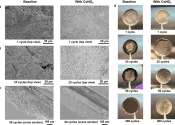Brookhaven National Laboratory
Brookhaven National Laboratory, (BNL) was founded in 1947 by the Atomic Energy Commission in Upton on Long Island in New York. Currently BNL is operated by Brookhaven Science Associates LLC, a partnership between Stony Brook University and Battelle Memorial Institute. The main focus of BNL today is Nuclear and high-energy physics research, physics and chemistry of materials, environmental and energy research, nonproliferation, neurosciences and medical imaging and structural biology. BNL employs about 3,000 scientists and hosts approximately 4,000 guest investigators each year. Six Nobel Prizes were awarded to scientists working at BNL.
- Address
- P.O. Box 5000, Upton, NY 11973-5000
- Website
- http://www.bnl.gov
- Wikipedia
- http://en.wikipedia.org/wiki/Brookhaven_National_Laboratory
Some content from Wikipedia,
licensed under CC BY-SA









